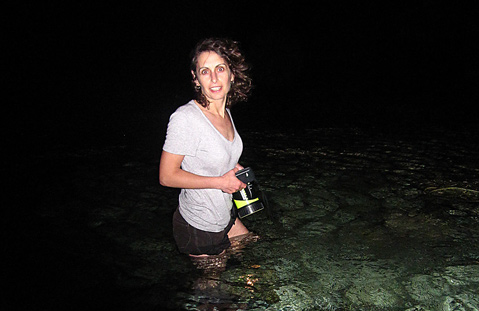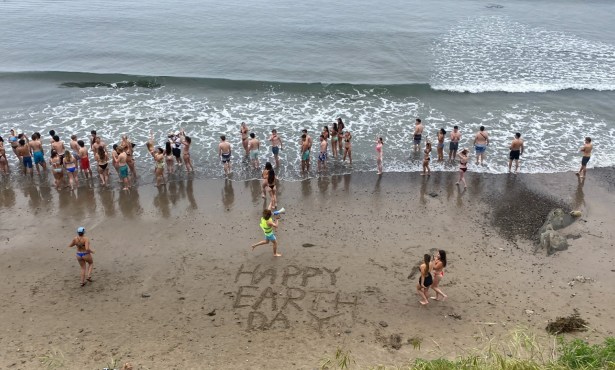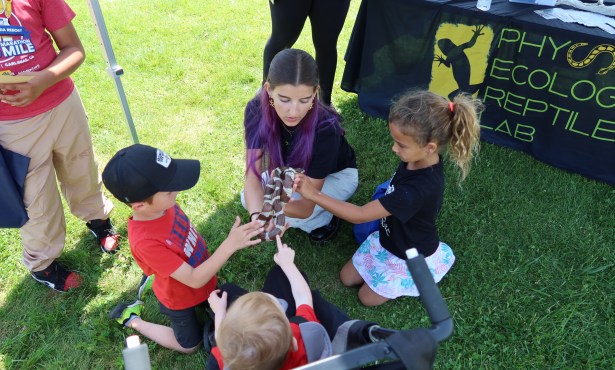Elizabeth Kolbert on the End of the World
The Sixth Extinction Author Comes to Santa Barbara this Weekend

Like it or not, everything dies. But these days, it seems, things are dying a little bit faster. From disappearing ice caps and bone-chilling polar vortices to historic drought and worldwide super storms, Mother Earth is behaving in ways well outside the norm with an ever increasing frequency matched perhaps only by the speed at which climate-change deniers are learning to bite their tongues.
Enter New Yorker staff writer Elizabeth Kolbert and her brand-new book, The Sixth Extinction: An Unnatural History. A veteran storyteller from the climate-change discussion, Kolbert manages to do the nearly impossible with her new book by delivering a short, sweet, truly educational and entertaining account of what is really going on in our natural world while simultaneously laying bare just how heavy the human hand has been in all of it. As a lead-up to her visit to the South Coast later this week, Kolbert talked shop with The Santa Barbara Independent, waxing philosophic on her book, the true motivation of climate-change deniers, how she manages to not be depressed by all her work, and what she tells her children about the future they face.
One of the crowning achievements of this book is the fact that it explains fairly complex scientific situations in a way that is quite accessible to the layperson. What exactly is your science background? No science background. Zero. I was a German Literature major in college, and then I went into reporting pretty much right after. I covered politics for a long time, and I do see analogies there — both politics and science can present complex issues for the general public. I also feel that not really having a science background is an advantage because if I don’t understand something, chances are my readers aren’t going to understand it.
And, in this case, what you are trying to get them to understand is pretty depressing. I mean, you are explaining how we are in the midst of a major global extinction of sorts and the human race is to blame. I prefer the word tragic. A lot of the things that occupy the news are depressing, but this goes beyond that. This is about the whole state of the planet. Ironically, or maybe it’s paradoxically, as part of writing the book I got to go to these amazing places — the Great Barrier Reef, the Amazon, the Andes — and see these truly amazing ecosystems. I tried to really infuse that and bring those trips and that sense of amazement into the book because I do realize that this is a pretty heavy topic. So in a way it is also an adventure story.
Part and parcel to that, and what is so cool about The Sixth Extinction, is that you take these environmental doomsday buzz phrases like climate change and ocean acidification and such and give them context and discuss them with some refreshingly illuminating historical context and real-world scenarios. You got it. That is really the point of writing the book. People get these dribs and drabs of information, and I really tried to find a bigger perspective. That gets back to your point about it being depressing — a lot of those dribs and drabs are depressing, and so people end up trying to tune them out. I tried to put things together in a big-picture sort of way. I hope that one of the satisfactions from reading is the satisfaction that comes from understanding and not just getting these disconnected pieces of information that really don’t make any sense to the average person.
Knowing what you know now, how do you see the future unfolding? I feel that we live in this amazing moment. Right now turns out to be just extraordinary, and we turn out to be an extraordinary species. As to what exactly is going to happen, I don’t pretend to know more than the many people I interviewed, but I do think that this is the biggest question of our time: “What are we going to do with this information that we now know?” We have been at this sort of world-altering point for quite a while, but now it is truly accelerating, and most of us know it or at least intuitively understand it just because of the way we see the world changing around us. Every day brings new understanding both of our impacts and of what the geological history of the world is and how extraordinary we are in the context of that geological history. We have all this new information, but what we are going to do with that knowledge? That is what is going to occupy us certainly for the rest of this century.
As a parent, how does this impact you? At any moment in history you can only hope for the best for your own kids and for all the kids of the world. But certainly, as a generation, I’m not very proud of what we are leaving to our children.
What’s the vibe with the scientists and researchers you talked to? Are they panicked or just sitting there watching and taking notes? One of the fascinating dichotomies in all of this is that they will sit there and tell you, “Whoa, this an amazing story. I am watching things happen that I was told in graduate school only a decade ago could never happen.” So yeah, on one level it is incredibly interesting and scientifically captivating, but on another level it is just absolutely horrible, and they know it. But really, the more you know, the more seriously you take it both intellectually and emotionally whether you are a scientist or not.
But still, even here in “aren’t we progressive” Santa Barbara, there are people, high-ranking elected officials even, who refuse to accept that there is anything abnormal going on. How do you respond to that? One of the stories I tell in the book is the story of these two extremes in the history of science when people came to the first theories of extinction and how they were cataclysmic and reoccurring and how that line of thinking was basically discredited and denied even though there was quite a bit of evidence supporting it. It wasn’t until very recently that scientists have confronted the fact that there have been, very rarely, these periods of massive extinctions in our history. So I think the idea now that we are causing a new one is a very difficult thing for people to get their minds around, especially since many of the ways in which we are doing it is by doing the most prosaic things like, you know, driving our kids to school. I mean, there are 20 pounds of CO₂ for every gallon of gas you combust in your car. It is difficult for even me to wrap my mind around. It is not necessarily something you would have expected to happen, but it turns out that this is just the way that the world works.
What we are doing when we burn fossil fuels — a geological process that took hundreds of millions of years to run in one direction and cause all that carbon to get buried underground — is running it in the opposite direction and doing it very, very fast. It takes a major backing up from the everyday to see this big picture, and that is exactly what I am trying to get people to do with this book. … We have this responsibility to face up and be accountable even if we don’t have the answer to fixing it. There is something very ethically juvenile about not being willing to face up to that. I think denial is about exactly that; it is about not being able to face up to the consequences of what we are doing because they are very painful. I can understand that, but it is just no longer acceptable.
4•1•1
Elizabeth Kolbert will speak at UCSB’s Campbell Hall on February 18 at 8 p.m. For more information, visit artsandlectures.sa.ucsb.edu
Editor’s Note: A mistake inadvertently crept into this story, which was revised on February 13, 2014, to state that 20 pounds, not tons, of CO₂ is emitted for every gallon of gas burned in a car.



